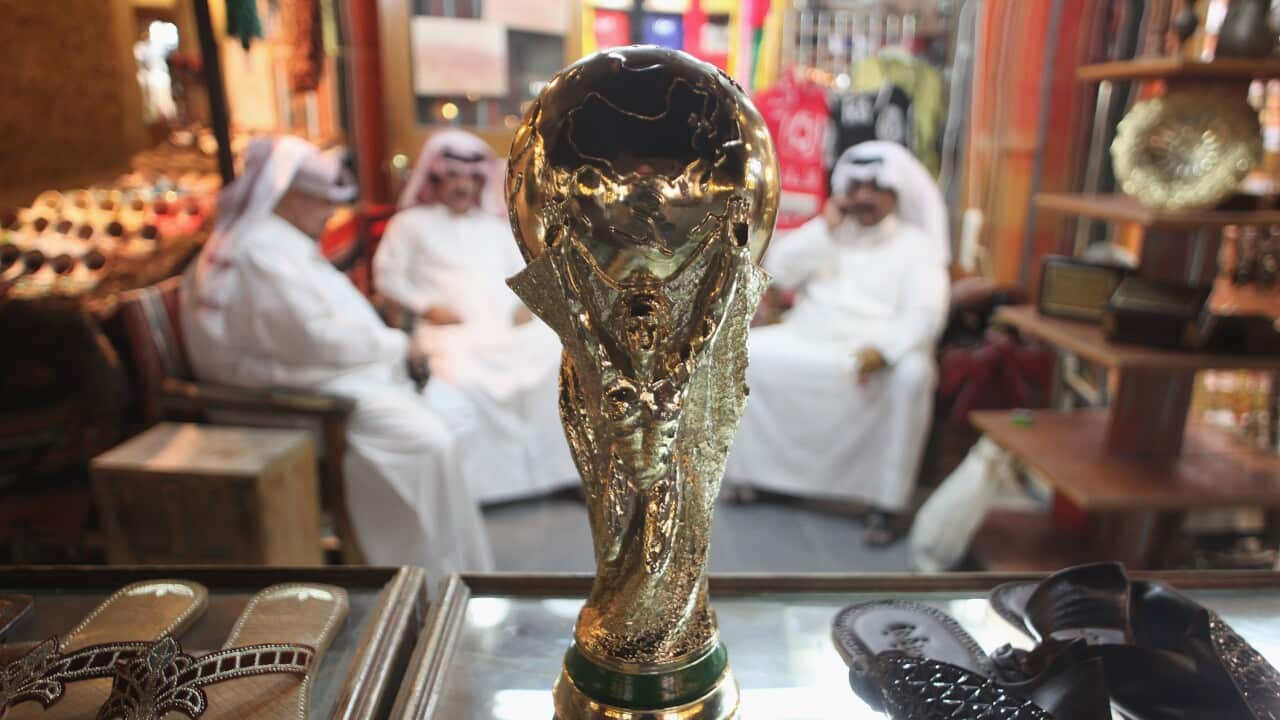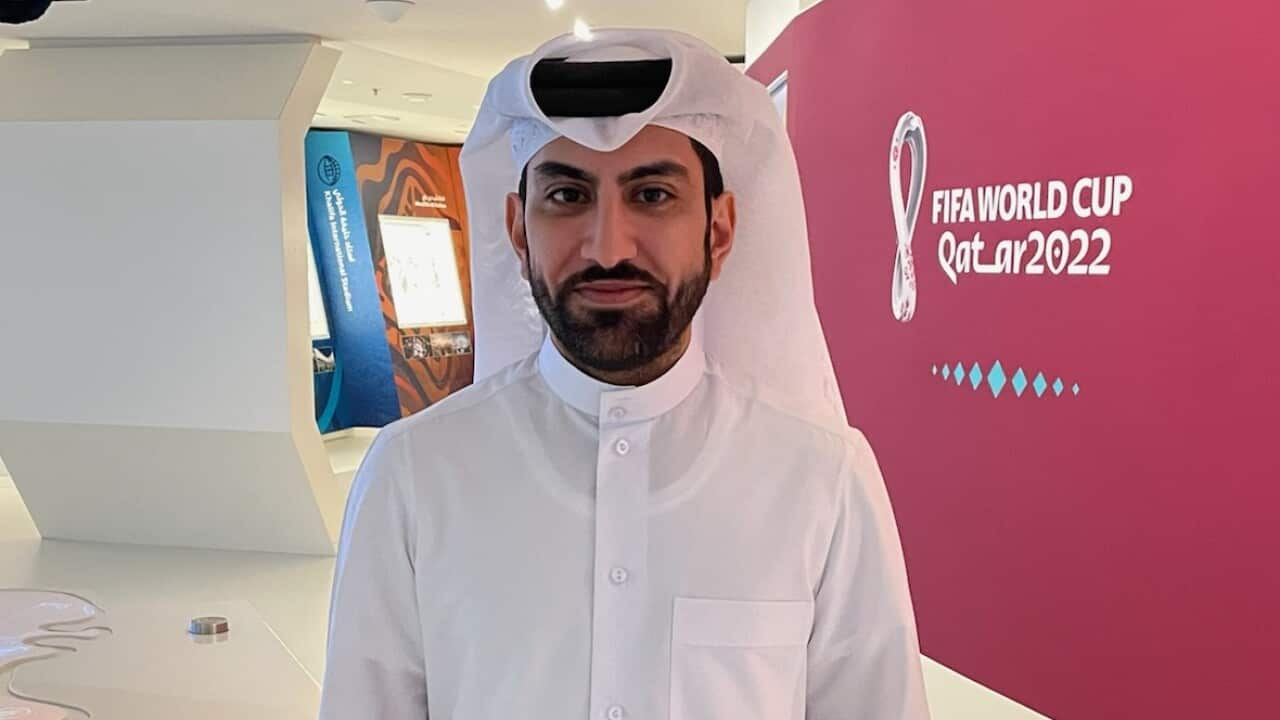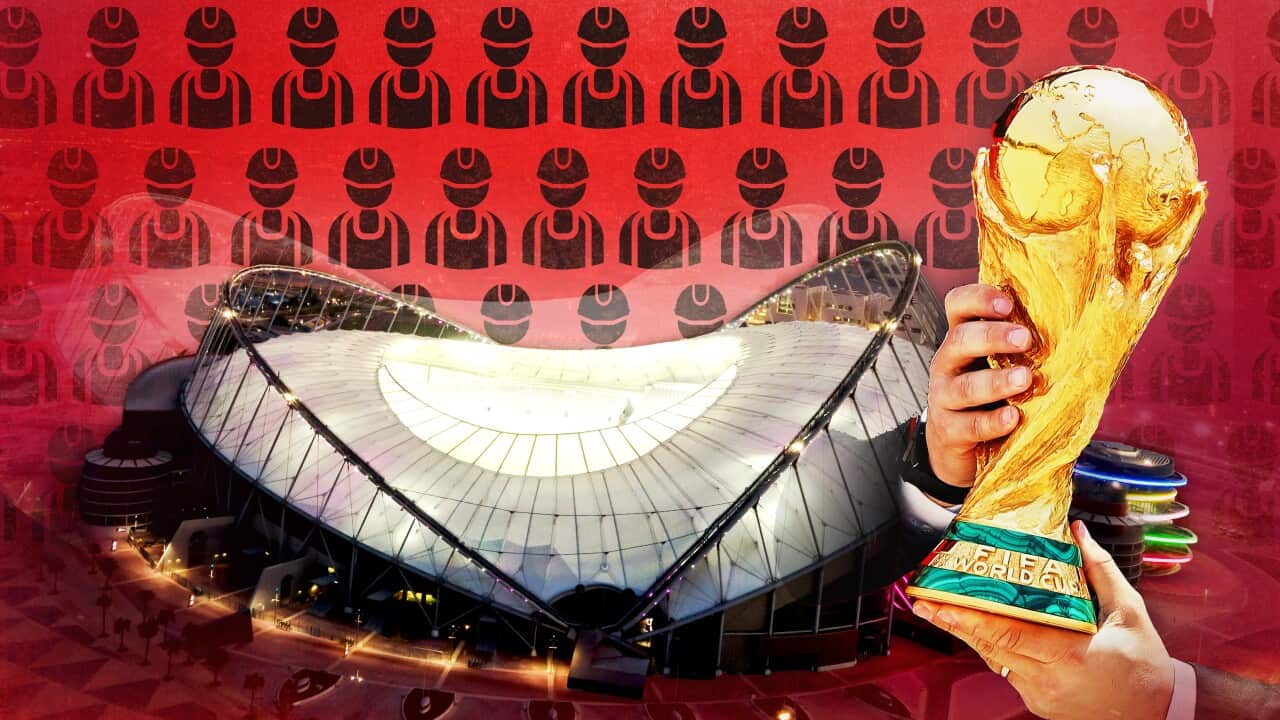

9 min read
This article is more than 2 years old
Explainer
10 things you probably don’t know about Qatar
Home to men, media and money, here are some facts about the 2022 FIFA World Cup host country that may surprise you.
Published
Updated
By Isabelle Lane, Ken Macleod
Source: SBS News
Image: Qatar is the first country in the Middle East to host a FIFA World Cup, but there's more to the story than just football. (Sean Gallup/Getty Images)
Qatar’s 12-year journey to hosting the 2022 FIFA World Cup is complete. The wealthy Islamic nation on the Arabian Peninsula is the first country in the Middle East to host the coveted tournament.
Football’s world governing body, FIFA, awarded Qatar the rights in 2010, and the choice has proven to be a controversial one.
allegations, the , and people have all come under international scrutiny in the build-up. But here are some things you might not know.
1. The entire country is smaller than Sydney
Qatar is a tiny country and the smallest to ever host a World Cup.
The emirate occupies approximately 11,586 square kilometres (km²) of land, making it smaller than Sydney (12,368 km²), but bigger than Melbourne (9,990 km²).
Qatar’s land mass is just 0.15 per cent that of Australia as a whole, which occupies a total of 7,741,220 km².

Source: SBS News
2. Qatar’s ruler wasn’t his dad’s first choice
Qatar’s 42-year-old ruler Sheikh Tamim bin Hamad Al Thani took over as emir of Qatar in 2013 after his father, Sheikh Hamad, abdicated the throne.
Sheikh Tamim wasn’t actually his father’s first choice as successor but became the heir apparent in 2003 after his older brother Sheikh Jassim renounced his claim to the throne.
He was educated in the United Kingdom, graduating from the Royal Military Academy at Sandhurst.

Source: SBS News
Qatar had a fertility rate of 1.8 births per woman in 2020, according to the World Bank.
Sheikh Tamim is a big fan of the sport, and has owned the Paris Saint-Germain (PSG) football club since 2011 through Qatar Sports Investments (a subsidiary of Qatar's sovereign wealth fund).
3. Men out-number women three-to-one
Qatar has the lowest share of women worldwide, with only one in four people in the country being female (25.04 per cent).
The disparity has been attributed to Qatar’s population growth in recent years, rising from just 615,000 people in 2001 to more than three million today.

Source: SBS News
4. Avoid kissing, and giving the middle finger!
While the Qatari people are known for their hospitality and welcoming attitude, there are also strict laws and social norms in place.
A highly conservative Muslim country, public displays of affection, including holding hands and kissing, are frowned upon.

Source: SBS News
Swearing and making rude gestures, particularly raising the middle finger, are punishable by law. Photographing sensitive sites and local people, especially women, can also land you in trouble.
The dress code also differs from Australia with visitors "expected to cover their shoulders and knees when visiting public places like museums and other government buildings".
However, international visitors attending the World Cup are unlikely to be prosecuted for minor offences, according to an official document seen by SBS News.
The legal drinking age in Qatar is 21, and alcohol consumption and drunkenness are illegal in public spaces, outside of designated areas.
Bringing alcohol into the country is also illegal, as is bringing pornography, pork products, firearms and religious books or materials other than those relating to Islam.
Qatar also has strict laws governing sex and relationships and criminalises sexual acts and relationships between persons of the same sex or unmarried people.
Same-sex sexual activity is for both men and women.
FIFA and Qatar’s Supreme Committee for Delivery and Legacy have given assurances that “everyone is welcome” and LGBTQ+ fans will not face discrimination during the tournament.
5. There’s no such thing as a ‘tree change’
The COVID-19 pandemic saw a rise in the number of people making ‘tree changes’ in Australia - foregoing the city for the country. But in Qatar, that option doesn’t exist - everyone lives in the city.
The desert country has almost no arable land for farming, has no forests, and the entire population lives in urban areas, mostly in the capital city of Doha (home to more than 90 per cent of the nation's residents).

Source: SBS News
Qatar is also almost entirely flat and, at its highest point, is only 103 metres above sea level. It’s not the lowest, though, the Maldives is the flattest country on earth. Who knew?
6. Doha is one of the safest cities in the world
Qatar’s capital, Doha, is consistently ranked as one of the safest cities in the world when it comes to crime.
According to database Numbeo’s 2022 crime index by city, which estimates an overall level of crime in a given city based on surveys from visitors to its website, Doha is the second-safest city in the world, behind Abu Dhabi, UAE, and ahead of San Sebastian, Spain.

Source: SBS News
Canberra is the highest-ranking Australian city at number 31, behind Tampere, Finland, and ahead of Tallinn, Estonia.
7. Qatar is not a ‘free’ country
According to , - the same as its 2021 ranking. Qatar scored 7/40 for political rights, and 18/60 for civil liberties.
Freedom House is a majority US-government-funded non-profit founded in 1941. It ranks people’s access to political rights and civil liberties in 210 countries and territories through its annual Freedom in the World report.
Qatar became an independent state in 1971 and has since been ruled by emirs descending from the House of Al Thani. Before that, Qatar was a British protectorate since 1916.
The emir is the monarch, head of state, commander-in-chief of the armed forces and guarantor of the constitution.

Source: SBS News
“While Qatari citizens are among the wealthiest in the world, most of the population consists of noncitizens with no political rights, few civil liberties, and limited access to economic opportunity.”
Australia - a fall of two points from 97/100 the year before - and was rated as "free". It scored 39/40 for political rights, and 56/60 for civil liberties.
Only Finland, Norway, and Sweden scored 100/100, followed by New Zealand on 99/100.
Countries including Malaysia and Singapore were rated as ‘partly free’, scoring 50/100 and 47/100 respectively.
Syria was at the bottom of the list, rated ‘not free’ with a score of 1/100, while North Korea scored 3/100.
8. It’s home to one of the world’s biggest media organisations
Al Jazeera Media Network reaches more than 270 million households in over 140 countries and is based in Qatar.
Launched in 1996, Al Jazeera Arabic was followed in 2006 by Al Jazeera English.
However, “covering domestic political issues remains a real challenge for journalists” in Qatar, (RSF).

Source: SBS News
"Each subsidiary in the Al Jazeera Media Network follows the same principles and values that inspire it to be challenging and bold, and to provide a voice for the voiceless in some of the world’s most unreported places," .
9. There’s a lot of cash to splash
Qatar is one of the richest countries in the world and has spent a lot of money on the World Cup, with surpassing $330 billion.
According to the World Bank, behind Luxembourg, Singapore and Ireland, with a of $93,521 (. "An international dollar would buy in the cited country a comparable amount of goods and services a US dollar would buy in the United States," the World Bank explains.
Qatar owes much of its wealth to its natural resources, with oil discovered in 1939, followed by natural gas 30 years later.

Source: SBS News
Qatar also boasts the longest oil well in the world at over 12 kilometres.
10. All roads lead to football
During the World Cup there will only be football in Qatar.
All roads will lead to stadiums, schools will be closed, work from home will be adopted and no private vehicles will be allowed on the roads.

Source: SBS News
Around 1.2 million people are expected to visit Qatar for the World Cup.
You can stream every match of the FIFA World Cup 2022™ , and watch full replays, mini-matches and highlights.



